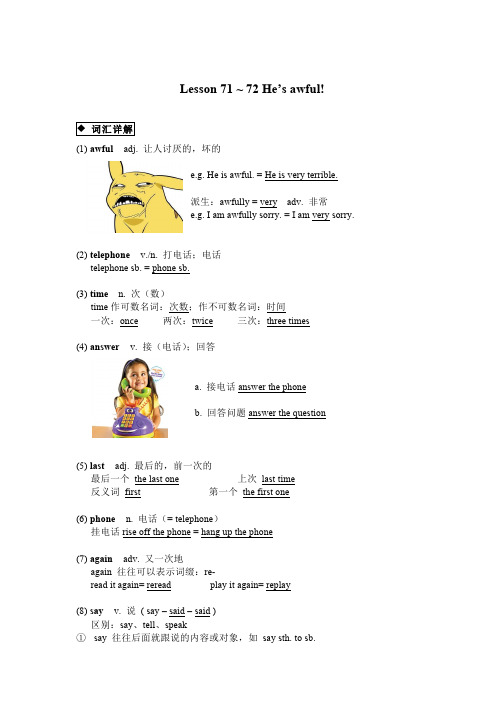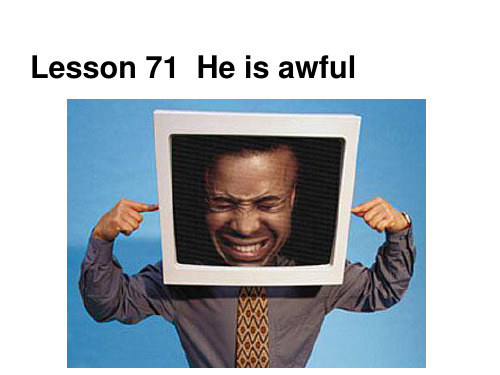新概念英语第一册第71-72课
- 格式:ppt
- 大小:1.14 MB
- 文档页数:3

Lesson 71 ~ 72 He’s awful!!词汇详解(1) awful adj. 让人讨厌的,坏的e.g. He is awful. = He is very terrible.派生:awfully = very adv. 非常e.g. I am awfully sorry. = I am very sorry.(2) telephone v./n. 打电话;电话telephone sb. = phone sb.(3) time n. 次(数)time作可数名词:次数;作不可数名词:时间一次:once 两次:twice 三次:three times(4) answer v. 接(电话);回答a. 接电话answer the phoneb. 回答问题answer the question(5) last adj. 最后的,前一次的最后一个the last one 上次last time反义词first 第一个the first one(6) phone n. 电话(= telephone)挂电话rise off the phone = hang up the phone(7) again adv. 又一次地again 往往可以表示词缀:re-read it again= reread play it again= replay(8) say v. 说( say – said – said )区别:say、tell、speak①say 往往后面就跟说的内容或对象,如say sth. to sb.自言自语say to oneself② tell 往往具有告知的含义,如 tell sb. to do sth.说谎tell a lie 讲故事tell a story③ speak 后面往往是跟语言或人如speak to sb. 意为“与某人说话”,常用于打电话时e.g. 请让玛丽接电话好吗? May I speak to Mary, please?! 重点语法一般过去时II(1) be 动词的过去式有两种形式:was 和were (请参见 Lessons 67-68语法部分)(2) 实意动词的过去式变化形式可分为:规则变化和不规则变化" 规则变化,其规则如下:a. 一般情况加-ed :look →looked watch →watchedb. 以不发音的e 结尾的加-d :smile →smiled like →likedc. 以辅音字母+y 结尾,变y 为i 再加-ed :hurry →hurried carry →carriedd. 以一个辅音字母结尾的重读闭音节词,双写字尾加-ed :pat →patted" 另一部分动词的过去式拼写不规则,因此称为不规则动词,需牢记:go →went get →got have →had say →said do →did(3) 用一般过去时的句子中常常有表示过去某一时刻的时间状语,如: 昨天 yesterday 昨夜 last night前天the day before yesterday昨天上午 yesterday morning# 试一试:。




Lesson 71 单词讲解1.awful adj. 让人讨厌的,坏的2.telephone v. & n. 打电话;电话call3.time n. 次(数)once /wʌns/ twice /twais/ three times four times …I read this book twice.4.a nswer v. 接(电话)answer the phonest adj. 最后的,前一次的last night / last week / last month / last year6.phone n. 电话7.again adv. 又一次地Very nice to see you again.8.say (said) v. 说say /sei/ said /sed/ says /sez/say VS speaksay 强调说话的内容She said hello to me.He said sorry to me.My mom always says “Life was like a box of chocolate…”speak 突出说话的方式或动作本身speak loudly speak slowly speak EnglishLesson 71 课文讲解What is the climate like?What is the weather like?He telephoned me again.yesterday evening last nightLesson 71 语法讲解He was in the office.Was he in the office?Yes, he was. No, he wasn’t.He wasn’t in the office.Where was he?Who was in the office?There was a car race in our town in 1998. Was there a car race in our town in 1998? There wasn’t a car race in our town in 1998. What was there in our town in 1998?He went to school yesterday. do did /did/ Did wentDo he go he Do to school yesterday? ? e He like s coffee .He went to school yesterday. do notdid He donotgowent to school yesterday.He didn’t go to school yesterday.He went to school y e s t e r d a y. 他什么时候去上学了?did When do hegowent to school?He went to s c h o o l yesterday. 他昨天去哪了?did goWhere do he went yesterday?He w e n t to school yesterday. 他昨天干什么了?did doWhat do he did yesterday?He went to school yesterday. 昨天谁去上学了?Who went to school y esterday?She lived in New York.Did she live in New York? Yes, she did. No, she didn’t. She didn’t live in New York. Where did she live?Who lived in New York?I bought a book in that bookstore last week. bought /b ɔ : t/ buy 的过去式Did you buy a book in that bookstore last week? Yes, I did. No, I didn’t.I didn’t buy a book in that bookstore last week.When did you buy a book in that bookstore?Where did you buy a book last week?Lesson 72 单词句型讲解Today:this morningthis afternoonthis eveningLesson 72 单词句型讲解t onightLesson 72 单词句型讲解Yesterday:yesterday morningyesterday afternoonyesterday eveningLesson 72 单词句型讲解l ast nightThe day before yesterday:the day before yesterday in the morningthe day before yesterday in the afternoonthe day before yesterday in the evening如遇到视频无法正常播放,课件错误,知识点错t 误h 等e 课n 程问ig 题h ,t 可b 以e 添f 加o 服r 务e Ql Qa 3s 17t 0322794进行解决,学习问题请到知识堂: http:/Tomorrow:tomorrow morningtomorrow afternoontomorrow eveningtomorrow nightThe day after tomorrow:the day after tomorrow in the morningthe day after tomorrow in the afternoonthe day after tomorrow in the eveningthe night after next1.She is going to come now. (when)2.She can come now. (when)3.She wants a new bike. (what)4.There is a book on the table. (what)5.They like black coffee. (what)6.Mary comes from Germany. (where)7.He must go home now. (when)8.She feels ill. (how)9.He has a cold. (what)10.She cleaned her shoes. (when) A 一般疑问句B 特殊疑问句C 否定句1.She is going to come now. (when)Is she going to come now?When is she going to come?She isn’t going to come now.2.She can come now. (when)Can she come now?When can she come?She can’t come now.3.She wants a new bike. (what)Does she want a new bike?What does she want?She doesn’t want a new bike.• 4. There is a book on the table. (what)•Is there a book on the table?•What is there on the table?•There isn’t a book on the table.5.They like black coffee. (what) •Do they like black coffee?•What do they like?•They don’t like black coffee.6.Mary comes from Germany. (where) •Does Mary come from Germany?•Where does Mary come from?•Mary doesn’t come from Germany.7.He must go home now. (when) •Must he go home now?•When must he go home?•He needn’t / mustn’t go home now.8.She feels ill. (how) •Does she feel ill?•How does she feel?•She doesn’t feel ill.9.He has a cold. (what)•Does he have a cold?•What does he have?•What is the matter with him?•He doesn’t have a cold.10.She cleaned her shoes. (when) •Did she clean her shoes?•When did she clean her shoes?•She didn’t clean her shoes.。

第71-72课的内容: ⼀、重要句型或语法 1、⼀般过去时 表⽰过去发⽣的⽽现在已经结束的动作或状态。
本课主要学习的是动词的过去式的规则变化,即在动词词尾加-ed/-d(加在以不发⾳的e结尾的单词后⾯)。
如:telephoned, arrived; answered。
2、过去时间的表达 由yesterday引起的时间状语,如: 1)yesterday morning/afternoon/evening; 2)the day before yesterday in the morning/afternoon/evening; 3)last night/the night before last。
⼆、课⽂主要语⾔点 What's Ron Marston like, Pauline? He's awful. 1)What's sb. like?,⽤来询问某⼈怎么样,多指询问其性格、为⼈等。
2)awful本义表⽰可怕的,在此表⽰令⼈讨厌的。
He telephoned me four times yesterday and three times the day before yesterday. 1)telephone⼀般⽤作名词,表⽰电话。
在此⽤作动词,表⽰打电话,⼀般直接⽤作:telephone sb.,相当于phone/call sb.。
telephone是以不发⾳的e结尾的,所以过去式直接加-d。
2)time如果表时间,是不可数的。
在⽂中表⽰次数,是可数的。
My boss answered the telephone. answer the telephone,表⽰回电话。
What did your boss say to him? 在此要进⾏动词⼀般过去时的句型转换训练,即肯定句变为否定句、⼀般疑问句和划线部分提问,可选取本⽂中的句⼦来操练。
He said, 'Pauline is typing letters. She can't speak to you now.' said是say的过去式,属不规则变化,但考虑到本课的侧重点是在动词过去式的规则变化上,所以不宜作过多拓展,点到即⽌即可。
新概念英语第一册第71-72课:He’s awfulLesson 71 He's awful!他讨厌透了! Listen to the tape then answer this question.How did Pauline answer the telephone at nine o'clock?听录音,然后回答问题。
波淋在9点接电话时是如何说的?Jane : What’s Ron Marston like , Pauline ?简:罗恩.马斯顿是怎样一个人?Pauline : He’s awful ! He telephoned me four times yesterday , and three times the day before yesterday.波淋:他讨厌透了!他昨天给我打了4次电话前天打了3次。
Pauline: He telephoned the office yesterday morning and yesterday afternoon. My boss answered the telephone .波淋:他昨天上午和下午把电话打到了我的办公室,是我的老板接的。
Jane : What did your boss say to him ?简:你老板是怎么对他说的?Pauline: He said ,”Pauline is typing letters .She can’t speak to you now !”波淋:他说:“波淋正在打信,她现在不能同你讲话!”Pauline : Then I arrived home at six o’clock yesterday evening .He telephoned again .But I didn’t answer the phone !波淋:后来,我昨晚6点钟回到家里。
他又打来电话,但我没接。
Jane : Did he telephone again last night ?简:他昨夜里又打电话了吗?Pauline : Yes , he did . He telephoned at nine o’clock .波淋:是的,打了。
Lesson 71-72 He’s awful!他讨厌透了!基础达标一单词拼写1.又一次地 ____________________2.昨天_________________________3.次数 ________________________4.接电话_______________________5.让人讨厌的 __________________6.打电话_______________________7.最后的 ______________________8.电话_________________________二语法练习1. ----When _____ you _____ (write) this song?----I ____ (write) it last year.2. My friend, Carol, _____ (study) for the math test and _____(practise) English last night.3. ----_____ Mr.Li ____(do) the project on Monday morning?----Yes, he _____.4. ----How ____ (be) Jim’s weekend?----It ____ (be not) bad.5. ----______ (be) your mother a sales assistant last year?----No, she ____(be not).三选择( )1.Our teacher , Miss Chen, ______ English on the radio the day before yesterday.A. teachesB. taughtC. had taught( )2. ----Who cleaned the blackboard yesterday, Dick?----John _____.A. cleanedB. doesC. did( )3. After the game they ___ the last bus, so they had to take a taxi.A. tookB. caughtC. missed( )4. They ____ a meeting yesterday afternoon.A. hasB. hadC. have( )5. We _____ any classes last week.A. didn’t haveB. don’t haveC. didn’t had( )6. He ____ lunch an hour ago. Now, he is out.A. hasB. hadC. have( )7.----Were you at home yesterday?----No, I ____. I was _____ work.A. wasn’t/atB. weren’t/inC. wasn’t/in( )8. The twins ____ in China last year. They ___ here again next year.A. are/comeB. were/are comingC. was/are going( )9.We ____ a class meeting three days ago.A. don’t hadB. didn’t haveC. didn’t have( )10. ----Hello, is that Frank?----No, It’s ____, Mary.A. IB. meC. mine能力提升四阅读Once there was an old man in a town. He always forgot a lot of things. So his wife always had to say to him, “Don’t forget this!”One day he went on a long trip alone. Before he left home, his wife said ,“Now you have all these things. They are what you need for your trip. Take care of your things during the trip.” He went to a station, bought a ticket and got on the train with it.About half an hour later, the conductor began to see the tickets. He came to the old man and said, “Will you please show me your ticket?”The old man looked for his ticket in all his pockets, but he could not find it. He was very worried,“I can’t find my ticket. I really bought a ticket before I got on the train.” said the old man.“I believe you bought a ticket All right, you don’t have to buy another one.” said the conductor kindly. “But how can I know where I’m going ? I can’t remember my station!” the old man said sadly.( )1.The old in the story was very _____.A. kindB. poorC. forgetful( )2. Where is the ticket?A. The old man forgot to buy it.B. The old man couldn’t remember where it is.C. The old man showed it to the conductor.( )3. The old man bought the ticket ____ he got on the train.A. afterB. beforeC. when( )4. The conductor ____ the old man.A. didn’t believeB. laughed atC. believed( )5. The old man was sad because _____.A. he had to buy another ticketB. he lost all the things his wife gave himC. he did not know where he should get off五连词成句1. when ,your ,lost, find, and, did, where, you, car_________________________________________________1.was, born, in, 1988, September, I_________________________________________________2.they, a , that, said, built, year, hospital, before, they, the, last_________________________________________________3.the, didn’t, to, came, her, baby, go, until, mother, bed, back_________________________________________________4.Fiona, go, with, was, because, hiking, didn’t, friends, she, her, ill_________________________________________________。